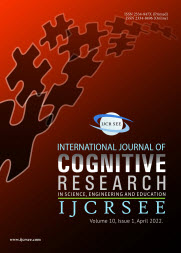Psychological Well-Being as Cognitive-Emotional Component of Student Self-Regulated Learning
Psychological Well-Being as Cognitive-Emotional Component of Student Self-Regulated Learning
Author(s): Eduard BalashovSubject(s): Cognitive Psychology
Published by: Удружење за развој науке, инжењерства и образовања
Keywords: cognitive-emotional factors; learning activity; psychological well-being; self-regulated learning; student
Summary/Abstract: The manuscript reports the theoretical aspects of studying the concepts of students’ psychological well-being in the process of self-regulated learning. The essence of student psychological well-being through a prism of cognitive and emotional personality factors has been theoretically studied. The role of psychological well-being and its components in the process of self-regulated learning activities of HEI students has been described. Psychological well-being has been viewed as an integral indicator of the level of personality, which affects resistance, and manifests itself in subjectively tangible satisfaction and life satisfaction. Self-regulated learning has been considered as a metacognitive level of initiation, motivation, monitoring, evaluation and control of all kinds and forms of internal and external activities by the subject of learning, which are aimed at reaching the predetermined goals of learning, personal and professional self-development and self-realization. The results of empirical research with the use of K. Ryff’s questionnaire entitled “Scales of Psychological Well-being,” as adapted by S. Karskanova, allowed us to evaluate personal growth, positive relationships with others, goals in life, managing environment, autonomy and self-acceptance which are indicators of individuals’ psychological well-being. Methods of statistical data processing such as descriptive statistics (group median - Me, arithmetic mean - M, standard deviation - σ) and the Kruskal-Wallis test, confirmed the existence of a statistically significant linear age-related decrease in indicators on the “Autonomy” Scale for the senior students. Analysis of the empirical data on the levels of defined psychological well-being has showed a linear correlation between psychological well-being and its levels. It has been concluded that the cognitive-emotional aspects of psychological well-being of modern student youth in learning activities have been dominated by dependent types of self-regulation in learning. The results have indicated that the most appropriate means to improve the psychological well-being of students, as a component of the emotional and behavioral level, is the formation of their active life position, responsibility for their own activities, motivation and autonomy in self-regulated learning activities. Prospective directions for future research have been described.
Journal: International Journal of Cognitive Research in Science, Engineering and Education (IJCRSEE)
- Issue Year: 10/2022
- Issue No: 2
- Page Range: 101-109
- Page Count: 9
- Language: English

